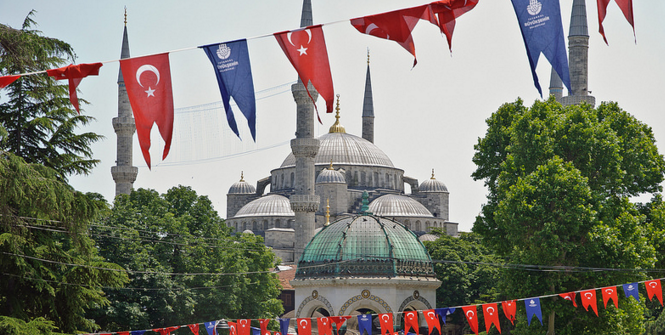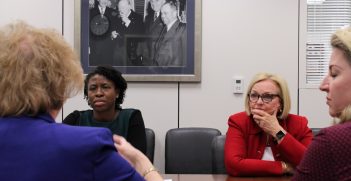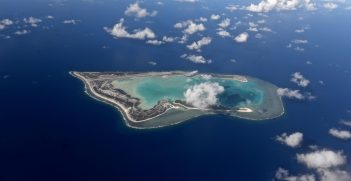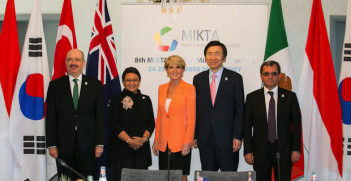Turkish Government’s Internal and External Conflicts Collide

On 12 January at 10:20am local time, a group of tourists walking in the historic Sultanahmet square were attacked by a suicide bomber in Istanbul, Turkey. Surrounded by the Roman-era Basilica Cistern, Ottoman Blue Mosque and Byzantine Hagia Sophia, the place of the blast was highly symbolic as a major tourist destination.
Ten people were killed and Turkish authorities were quick to name the suicide bomber as Nabil Fadli, a Syrian national who was born in Saudi Arabia in 1988. Fadli was announced to be one of the 2.5 million Syrian refugees who have passed into Turkey since 2011. His fingerprints found at the Sultanahmet square after the blast matched with the fingerprints taken by Turkish Immigration Authority upon his entrance to Turkey on 5 January 2016.
The Sultanahmet blast could be viewed as a continuation of a period of violence and resulting securitisation of domestic politics in Turkey that started after the 7 June 2015 elections. The escalation of violence commenced after the 20 July suicide bombing by an IS terrorist in Suruc, a south-eastern town which lies on the north side of the Turkish-Syrian border which separates it from the Syrian town of Kobane. Kobane had been the place of months-long struggle between Islamic State and Kurdish forces of YPG/HPG.
From then on Turkish people read news about Turkish army operations against PKK and YPG units both in Turkey and northern Iraq, assassinations, suicide bombings and arrests in their newspapers. They watched the “heroic” operations by the Turkish army, complemented by nationalist mob oratories by representatives of Erdogan’s AKP on their televisions. The media was not shy to contribute to the demonising of pro-Kurdish HDP and Kurdish movement as a whole. Two crucial moments were the killing of 17 Turkish soldiers after a massive PKK raid on a Turkish army quarter in Daglica on 6 September and a suicide bomb attack on 10 October, at the Labour, Peace and Democracy Rally organised by a large group of left wing organisations, socialist parties, pro-Kurdish HDP and trade unions in Ankara. At this rally 102 people were killed and 246 people were wounded.
The balance sheet of the 100 days after the 20 July Suruc attack consisted of the murders of 169 civilians and 148 Turkish security officers, including 79 soldiers and 66 policemen. This was accompanied by the killing of 1670 terrorists by the Turkish army in Turkey and abroad and also the arrest of more than 3300 people in Turkey. A period of violence and chaos throughout the five months between 7 June and the 1 November elections might have provided a safe majority government for the AKP, though the domestic politics have been far from stable since then. A curfew order in several towns in the Kurdish majority south-eastern region of Turkey is still ongoing and there is no sign of renewal of Kurdish negotiation process with the PKK which initially started in 2009. Parts of the country, other than the south-east, are heavily exposed to the nationalist-conservative narrative of the government media and censured mainstream media.
The infirmity of Turkish foreign policy with regard to the Syrian Civil War has been fanning the domestic fire with bellows. Since 2011, more than 2.5 million Syrians have passed the 950 kilometre long border and spread to Turkish cities without a reliable management mechanism. Most are living in poverty exploited by Turkish businesses as cheap and informal labour. Worse still, no government branch is aware of how many of these refugees are Islamic radicals, even IS militants. The frightening scenario is that the gap between fanciful neo-Ottomanist ambitions of the AKP elite and the cold realities on the Syrian war field might have transferred a pool of IS militants to Turkish cities.
Opening air bases for US and allied bombings against IS after the Suruc blast was a new chapter in Turkish policy towards the Syrian Civil War. The conflict between US priorities in Syria and the Turkish Syrian policy, determined by unhesitant Kurdophobia, seemed to be solved with the Incirlik agreement of August 2015. Turkey would not only provide air bases but would also join the ally operations. In return, the Kurdish forces would be prevented from passing to the west of the Euphrates River in Syria.
However, the shooting down of the Russian war plane on 24 November resulted in the closure of the Syrian air space to Turkish planes by Russian air force. This would harm Turkey more than the economic embargoes by Russia to Turkish products. Kurdish advances to the west of the river in the last days of 2015 have the potential to create a highly undesirable situation for the Turkish government: a Kurdish corridor all along the Syrian border, a barrier between Turkey and her government’s neo-Ottomanist dream lands. Plus, the AKP government has now considerably limited prospects to prevent its nightmare of Kurdish cantons by the border.
Meanwhile, the emphasis on securitisation in politics provided the AKP with an agenda to its benefit. The issues at stake are now completely different than before the 7 June 2015 election. Whilst the Turkish far-right was accusing AKP leaders of betrayal of the country because of the Kurdish negotiation process with the PKK, the extravagantly constructed illegal Presidential Palace was feeding the corrupt image of Erdogan and his family. Erdogan’s push to change the Constitution in order to create a Putin-style ultra-powerful Presidential post for himself was not well-liked by the population. However, the AKP managed to push pressing topics such as threats of terrorism and the need for a stable government to overshadow the negative agenda.
An adamant urge by Erdogan for the presidential system is expected to be the main source of instability in Turkey in 2016. Raising the spectre of terrorism and increasing tension would give more prospects to the AKP elite and Erdogan. ‘You are either with the state or with the terrorists’ was Erdogan’s slogan in his speech to ambassadors of foreign countries one hour after Sultanahmet blast, expectably equating himself and the AKP with the state. In the 38 minutes speech, while he spent 11 minutes lynching academics who prepared a call for peace and stop of military curfew in the Kurdish towns, he touched on the suicide bombing in Sultanahmet only 44 seconds. Similar to the previous suicide bombings and military operations in the south-east, the government immediately put a ban on media outlets. In the words of the main opposition leader, Kilicdaroglu, the ban on media related to the Sultanahmet blast came even faster than the ambulances.
As Professor Ferhat Kentel of İstanbul Şehir University noted, the Turkish deep state has been living its golden age under ‘apparatchiks of Erdogan in Islamist disguise and as Erdogan’s special operations unit [is] recruited mostly from old grey wolves’.
2016 will ostensibly be a hard year for Turkey. The elected authoritarianism of AKP will run into persistent problems, particularly in regards to the Kurdish south-east and Syria. The danger ahead for Turkey is Pakistanisation, while expecting Europeanisation for half a century.
Dr Murat Yurtbilir is an Associate Lecturer for the Centre for Arab & Islamic Studies at the Australian National University. This article may be republished under a Creative Commons License.





